Recent data obtained by Quilter (formerly Old Mutual International and Royal Skandia) under a freedom of information request has further highlighted the issue of financial education, or rather the lack of it, with many casualties of fraud ‘unaware they may have fallen victim‘ to such a scheme.
Quilter plc (the well-known asset/wealth management company, “life office”, and old friends of ours) has recently acquired figures clearly showing an absence of any kind of appropriate action from the ironically-named Action Fraud organisation. This data demonstrates that despite 400 pension fraud reports having been submitted to the inept crime-reporting centre in 2019 alone, as few as 26 of these cases were passed on to the police to investigate – representing just 6.6% of the total cases they handled.
| Year | Pension fraud reports received by Action Fraud | Pension fraud reports reviewed by NFIB | Pension fraud reports disseminated to the police and other agencies |
| 2015 | 1353 | 208 | 208 |
| 2016 | 547 | 97 | 97 |
| 2017 | 409 | 62 | 62 |
| 2018 | 346 | 46 | 38 |
| 2019 | 394 | 46 | 26 |
| Up to July 2020 | 161* | N/K** | 24* |
14 September 2020
*Figures omit February 2020 bulk upload of retrospective reports to avoid misrepresenting case volumes in 2020.
** Figure not disclosed in the FOI response
These same figures show that this year (as of July 2020), of the 161 pension fraud reports that were received by Action Fraud, only 24 have been disseminated to the relevant police force for investigation after the information was reviewed by NFIB (the National Fraud Intelligence Bureau). While this may represent a slight statistical improvement on previous years, this is neither good enough nor in any way acceptable – both for the victims of financial fraud, and the honest, decent, hardworking IFA’s out there who have seen the reputation of their profession suffer greatly at the hands of fraudsters and scammers alike.
The time has come to call out the thieves in their midst!
 Scams, and the lack of an active regulator in place to ensure their non-proliferation, undermine the reputation of the industry itself – and of any decent advisers out there.
Scams, and the lack of an active regulator in place to ensure their non-proliferation, undermine the reputation of the industry itself – and of any decent advisers out there.
The supposed altruism behind the actions of Quilter, who have seen the story of their plucky attempt at standing up for the little guy circulated by almost every major financial publication available in the UK, and by a fair few online and overseas English-language webpages/articles besides, is questionable at the very best – and a downright attempt at pulling the famous ‘Kansas City Shuffle‘ (when everybody looks right, you go left) at worst. I would like to use this opportunity to call “bull-“, as I believe I have heard my American friends say when faced with a claim that is clearly one of the more than 50 shades of bovine excrement currently available from all major stockers of the substance.
Quilter has, in the past ten years, facilitated hundreds of millions of pounds’ worth of pension scams with their “fertilizer”-based products.
Previously operating under the name Old Mutual International, OMI or Old Mutual for short, Quilter has helped the serial scammers behind all kinds of financial skullduggery get away with murder (or should I say fraud, to be more specific) under the – cough – “watchful” gaze of their CEO Paul Feeney, and Peter Kenny (another old friend of this publication).
It seems that almost every shady offshore firm has been taking advantage of Quilter and other life offices just like them being asleep at the wheel, with hordes of unlicensed investment firms popping up with increasing frequency and success in virtually every expat jurisdiction (especially Spain: e.g. Darren Kirby and Jody Smart at Continental Wealth Management).
Quilter are (at least partially) to blame. The well-known asset management company’s lack of responsibility when it comes to selling inappropriate products to any suitor who comes a-calling is – at this point – bordering on criminal negligence. (And that’s if you remove the border…)
Quilter are fully aware that the statistics they’ve obtained (£30,857,329 lost to UK pension scams since 2017) are downright misleading. They fall woefully short of demonstrating even the losses incurred by their own (Quilter’s) facilitation of financial crime in recent years generally – and the last three years particularly.

‘Tip of the Iceberg‘ indeed! Even the Titanic was given some sign of the peril hidden in the depths of the Atlantic as it hurtled to its certain and untimely demise!
Yet when it comes to financial fraud and investment scams (particularly those that involve unsuspecting clients’ pension pots), there is almost no pre-emptive warning given to the public, except for massively underestimated figures produced by the very people who have been clearing the way for the scammers from day one. And by that, I do – of course – mean the life offices (like Quilter/OMI) themselves.
I would like to take this opportunity to quote Jon Greer, who is the Head of Retirement Policy at Quilter. Mr Greer said: “We are entering a period of considerable economic uncertainty, and one in which generating a decent return on your investments will be extremely challenging. This is the ideal environment for scammers to thrive and it is no surprise to see huge amounts of money still being lost each year at the hands of criminals.
The fact that it is so hard to investigate and prosecute pension scams is effectively handing pension scammers a get out of jail free card. If you are mugged, it’s highly likely that the police will investigate, but lose your life savings to a pension scammer and your odds don’t look good.
– Jon Greer, Head of Retirement Policy @ Quilter
“Pension scams and other investment frauds are extremely complex, they can span multiple jurisdictions, and can often go uncovered for years before the victim realises their money is gone. This all makes investigating the scams incredibly time-consuming and expensive, which is why the police have to prioritise those few cases where they have a chance of success.
“The government have taken action on unsolicited pension calls with the ban on cold calling, but scammers are sidestepping the legislation and moving online. Movement on the regulation of search engines and social media platforms has been painfully slow and the regulation has failed to keep up with the evolution of scammers.
He went on to add, “The legal deterrent appears to be ineffective, so more must be done to prevent scammers from operating, and to do this we must cut the line of communication between the scammers and their victims: search engines and social media.
“The government has a perfect opportunity to bring the regulation into the 21st century by including financial harms within scope of the forthcoming Online Harms Bill. This will mean that, for the first time, search engines and social media platforms will be bound by a statutory duty of care to tackle harm caused as a result of content or activity on their services.”
“In doing so, search engines and social media providers will be legally required to remove suspected scammers immediately on notification, and not allow them to operate in the first place, or face sanctions from the new regulator,” he said.
As you can see Mr. Greer, and by association Quilter, talk a good fight and hit on almost every relevant point a consumer would want to hear from a company of their standing and stature within the financial industry; projecting themselves as a shining light – pouring their beacon out over the surrounding landscape and frightening any existing/would-be scammers out from their hiding places, while at the same time calling on the government for harsher penalties and swifter action to be taken (measures which Quilter themselves, and companies just like them, have blocked on numerous occasions).
And all this “bright light-shining” has served its purpose: leaving regulators, government and public alike too dazzled to notice the wrongdoing going on behind the source of the so-called light and within Quilter‘s very own doorstep!”
The narrative that Quilter/Old Mutual/OMI would have you believe is a ridiculous one, one of the main reasons I have written this piece is to challenge that narrative; and hopefully make you (the reader) think about a company that damns financial fraudsters and scammers alike with one hand, while secretly feeding them with the other.
The grim reality is substantially different from the one that Quilter aim to project for themselves. That being said, it makes my reply to J. Greer’s well put comments even easier:
“Actions speak louder than words, and all we’re hearing is a deafening silence. If you truly believe the message your company has spent tens, if not hundreds, of thousands of pounds to tell us – by buying article space from any major financial publication that would have you, and getting them to run the story you wanted to put out there.
It’s time to put your money where your mouth is, quite literally; and begin funding the financial education sorely needed in schools and workplaces throughout the country that will serve to prevent the kind of investment-based crime you claim to stand against!
“Oh and maybe, just maybe, improve upon your company’s policies so that you do not sell the very products that facilitate thieves who have stolen hundreds of millions of pounds by misselling those same products in just the last few years, whilst simultaneously trying to absolve yourselves of any blame.
“To put it simply: don’t take your definition of “action” from Action Fraud…”
RELATED ARTICLES
- Quilter warns advisers to be alert to fraud attempts
- Say NO to structured notes for pensions!
- International Adviser and the Old Mutual International/Quilter Scams
- RL360 and FPI – ’til death (or poverty) do us part







 Much as a master illusionist takes your breath away with his magic, a
Much as a master illusionist takes your breath away with his magic, a 


 The problem with money is that it blows away if you don’t hold it down, tie it up or stuff it down your knickers. That’s why you need to put it somewhere safe: in a shoe box on top of the wardrobe; under your mattress; in the safe or – if you’re feeling really brave – in the bank. Trouble is, left in cash, money shrinks (inflation, charges, moths). This is why so many advisers recommend a platform – aka “somewhere safe” to keep your money.
The problem with money is that it blows away if you don’t hold it down, tie it up or stuff it down your knickers. That’s why you need to put it somewhere safe: in a shoe box on top of the wardrobe; under your mattress; in the safe or – if you’re feeling really brave – in the bank. Trouble is, left in cash, money shrinks (inflation, charges, moths). This is why so many advisers recommend a platform – aka “somewhere safe” to keep your money.
 A bit like the lyrics to Hotel California, with an OMI “bond”, you can’t check out any time you want, and you can only leave after between five and ten years. OMI will take that number of years to claw back the commission paid to your adviser – even if you have long since learned that your adviser was an unregulated scammer and has conned you into unsuitable, high-risk, high-commission investments that have badly damaged your fund. You are stuck with paying the quarterly fees to OMI – even after your whole fund has gone. One victim went from plus
A bit like the lyrics to Hotel California, with an OMI “bond”, you can’t check out any time you want, and you can only leave after between five and ten years. OMI will take that number of years to claw back the commission paid to your adviser – even if you have long since learned that your adviser was an unregulated scammer and has conned you into unsuitable, high-risk, high-commission investments that have badly damaged your fund. You are stuck with paying the quarterly fees to OMI – even after your whole fund has gone. One victim went from plus  In Spain, the Supreme Court has ruled that bogus life assurance policies – such as those provided by
In Spain, the Supreme Court has ruled that bogus life assurance policies – such as those provided by 
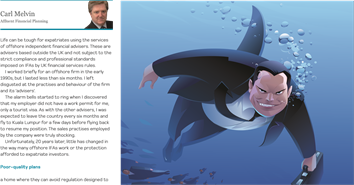 The arrival of wraps allows fee-based financial planners in the UK to offer a sound, client-focused service to expats, who up until recently have been easy prey to
The arrival of wraps allows fee-based financial planners in the UK to offer a sound, client-focused service to expats, who up until recently have been easy prey to 
 Long-term savings plans by Friends Provident,
Long-term savings plans by Friends Provident,  So here’s my suggested alternative: the LONG-TERM SAVINGS PIG:
So here’s my suggested alternative: the LONG-TERM SAVINGS PIG:
 Remember, it’s your money and your life. Don’t get conned into giving half your savings to the scammer and the life office.
Remember, it’s your money and your life. Don’t get conned into giving half your savings to the scammer and the life office.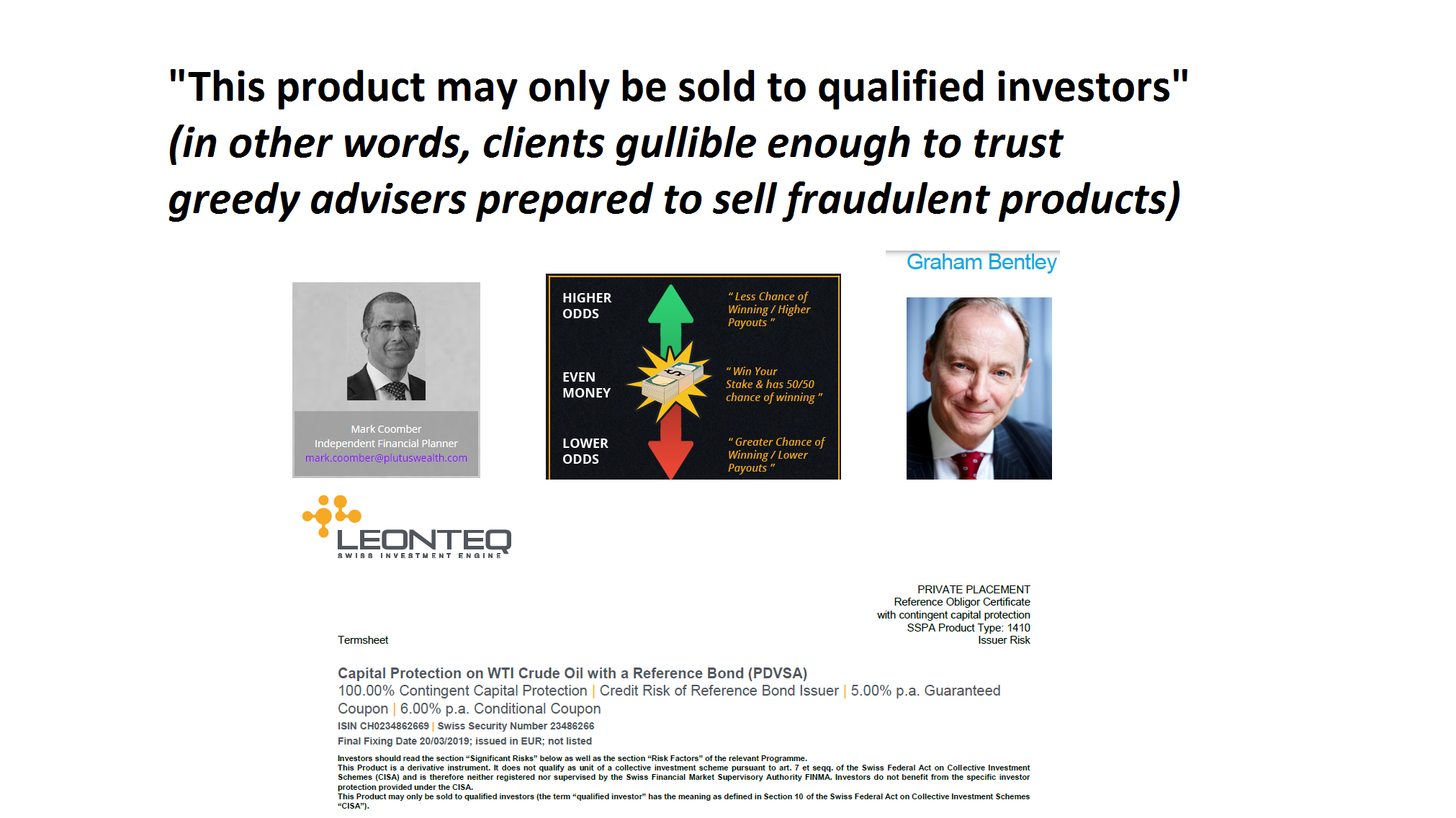
 Nitwit or Dragonfly? Gambling or Investing? Are investment losses as a result of a bad adviser or a bad investment? Or both? The real question is: how does the consumer tell the difference? A favourite episode of Fawlty Towers involved Basil’s ill-fated bet on a racehorse called Dragonfly. Confusion sets in – fuelled by the easily-confused Manuel – and “Dragonfly” gets muddled up with “Nitwit”. And that is how clients get confused just as easily: by advisers who spout the usual rubbish: capital protected; guaranteed returns; blue-chip investments; solid providers etc. They just leave out the three most important things: the fat commissions paid to the adviser; the high-risk nature of the “investment” and the fact that
Nitwit or Dragonfly? Gambling or Investing? Are investment losses as a result of a bad adviser or a bad investment? Or both? The real question is: how does the consumer tell the difference? A favourite episode of Fawlty Towers involved Basil’s ill-fated bet on a racehorse called Dragonfly. Confusion sets in – fuelled by the easily-confused Manuel – and “Dragonfly” gets muddled up with “Nitwit”. And that is how clients get confused just as easily: by advisers who spout the usual rubbish: capital protected; guaranteed returns; blue-chip investments; solid providers etc. They just leave out the three most important things: the fat commissions paid to the adviser; the high-risk nature of the “investment” and the fact that  And this guy is chartered! As a member of the CISI he should know better than to spout such rubbish – and I feel deeply sorry for any clients of Plutus Wealth Management as they are clearly in danger of being sold these toxic products. In fact, I would go further and suggest the public should be warned about the dangers of using this firm, as Coomber clearly has every intention of flogging his victims these high-risk products. If he is stupid enough to use them for his own gambling fun, good luck to him. But he has no right to inflict them on retail clients.
And this guy is chartered! As a member of the CISI he should know better than to spout such rubbish – and I feel deeply sorry for any clients of Plutus Wealth Management as they are clearly in danger of being sold these toxic products. In fact, I would go further and suggest the public should be warned about the dangers of using this firm, as Coomber clearly has every intention of flogging his victims these high-risk products. If he is stupid enough to use them for his own gambling fun, good luck to him. But he has no right to inflict them on retail clients.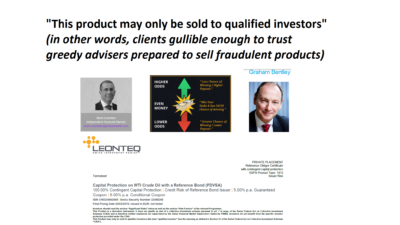 The term sheet did, to be fair, give a clear warning:
The term sheet did, to be fair, give a clear warning:

 Those of you who follow
Those of you who follow 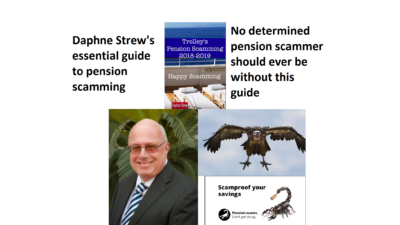
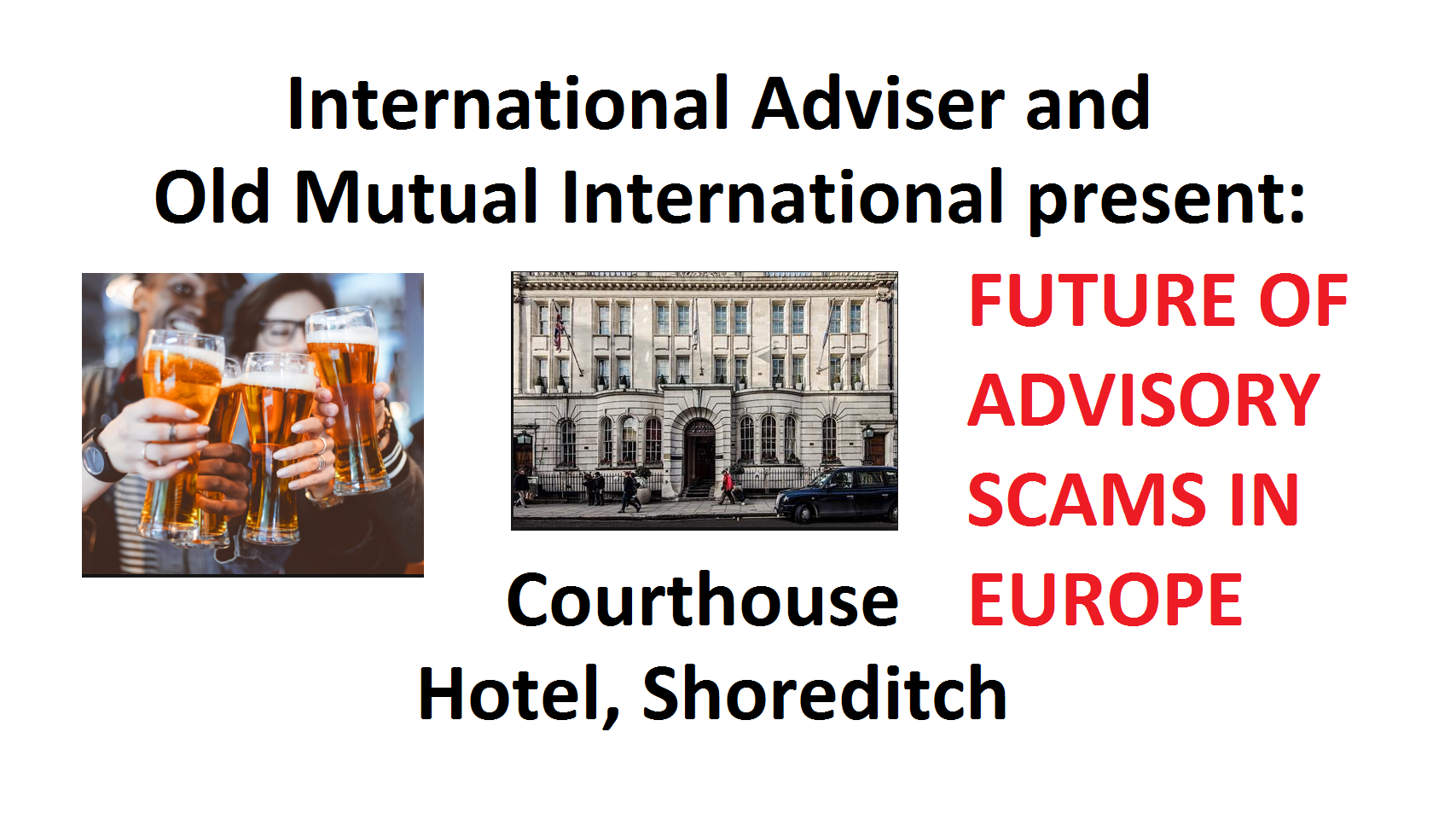
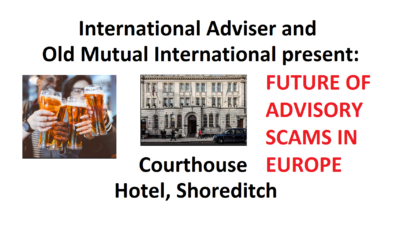 International Adviser and the Old Mutual International/Quilter Scams. Today’s jolly:
International Adviser and the Old Mutual International/Quilter Scams. Today’s jolly: International Adviser should hang its head in shame for failing to make sure that the perpetrators – especially Old Mutual International/Quilter – are brought to justice publicly for the destruction of hundreds of millions of pounds’ worth of life savings. And yet IA’s Old Mother Hubbard is consorting with them and giving Quilter’s Ryan Gardner a speaking slot on the
International Adviser should hang its head in shame for failing to make sure that the perpetrators – especially Old Mutual International/Quilter – are brought to justice publicly for the destruction of hundreds of millions of pounds’ worth of life savings. And yet IA’s Old Mother Hubbard is consorting with them and giving Quilter’s Ryan Gardner a speaking slot on the 
 International Investment has written a jolly good article about the recent action taken by the UAE Insurance Authority – headed up by His Excellency Ibrahim Al Zaabi. I quote from
International Investment has written a jolly good article about the recent action taken by the UAE Insurance Authority – headed up by His Excellency Ibrahim Al Zaabi. I quote from  The Gibraltar FSC
The Gibraltar FSC Holborn Assets’ Kensington Fund –
Holborn Assets’ Kensington Fund –  Back to the
Back to the  There are no details of costs, no fact sheets, no details of who is making the investment decisions. The directors are Scott Balsdon, Director of Holborn Assets, Globaleye and Adamou Riyad, CCO of Holborn Assets (and Noel Ford). So the fund is run by the same cowboys who run Holborn Assets – yeehaa!
There are no details of costs, no fact sheets, no details of who is making the investment decisions. The directors are Scott Balsdon, Director of Holborn Assets, Globaleye and Adamou Riyad, CCO of Holborn Assets (and Noel Ford). So the fund is run by the same cowboys who run Holborn Assets – yeehaa!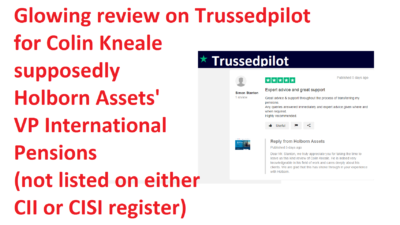 And, finally, Holborn Assets forge five-star Trustpilot reviews. How sad is that?
And, finally, Holborn Assets forge five-star Trustpilot reviews. How sad is that?
 I have been working for
I have been working for 


 Get all the information in hard copy and read it at least three times or however many times you need to read it to be completely comfortable that you understand everything.
Get all the information in hard copy and read it at least three times or however many times you need to read it to be completely comfortable that you understand everything.
Mark Coomber, Chartered MCSI Independent Financial Planner at Plutus Wealth Management